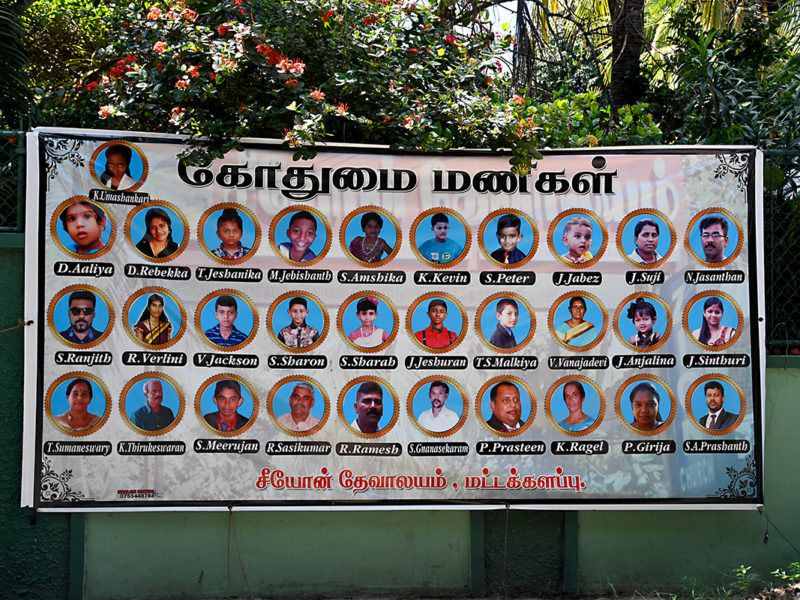THEApril 21st issue has etched firmly into the history of Sri Lanka. On Easter Day 2019, Christian islanders and foreign tourists were attacked by Islamist extremists. Zion in Batticaloa on the eastern coast was one of the churches bombed. Pastor Roshan Mahesan shared his story when South Asia’s Johan Mikaelsson came to visit.
In Batticaloa, the city on the eastern coast of Sri Lanka with 100,000 inhabitants, Tamil congregation members gathered at Zion Church on April 21, 2019 to attend the celebration on Easter Day in regular order. Already at half past nine it started to get really hot.
For Christians in Sri Lanka, the celebration of Jesus’ resurrection represents one of the highlights of the year. In the shade inside the church, the children gathered to attend Sunday school could sit down and listen to the music being played. The kids were dressed up and expectant.
The week before , ten people from three families in Batticaloa had been injured when a front bus crashed into an oncoming bus. Nine of the ten were members of the congregation. In the midst of grief, there was now time to again feel joy and fellowship.
About 7.5 percent of the island’s population is Christian. Among the island’s majority population, the Sinhalese, most are Buddhists and a smaller proportion of Christians. Here in Batticaloa, Tamils are the majority. Among Tamils, a quarter are Christian while Hindus make up three-quarters. The Muslim Moors, who have Tamil as their mother tongue, are categorized as their own ethnic group.
More than 80 percent of Christians on the island are Catholics. The Church of the Zion Church are Protestants, they belong to the Pentecostal movement and are categorized as “charismatic Christians”.
Outside the church, a young man was stirring occasionally. The man, 27-year-old Mohamed Nasar Mohamed Asad, stepped forward and sweated under a heavy burden. He was carrying a heavily packed backpack and plans to commit suicide.
Witnesses have stated to local and international media that the bomber first went to St Mary’s Cathedral to cause the most possible injury and death. When he arrived at half past nine the morning fair was over and the place was deserted. He then went to the nearby Zion Church.

Photo: Johan Mikaelsson
He began to feel stress. His like-minded friends would perform their deeds at hotels and churches on the west coast, in Colombo and Negombo respectively. Asad was part of a group of Islamist extremists who in recent years managed to build an organization that could procure explosives and plan synchronized blasts. On this very day, the planned acts of violence would be carried out.
In the town of Kattankudy nine kilometers south of Batticaloa, Muslims had for several years been troubled by the angry preacher Mohamed Zahran’s talk of violence against all those who did not share an extreme view of Islam and that it would govern everyone’s existence. The message from the National Thowheeth Jamath (NTJ) group was that all dissenters, including Muslims, would be killed.
A radicalization sponsored by Gulf states has taken place along the eastern coast of Sri Lanka
Those who have traveled along the east coast of Sri Lanka in recent decades have been able to see signs of a growing Islamist radicalization, which was cheered on and sponsored by Gulf states. Some young Sri Lankan men had also traveled to fight IS in Syria and Iraq. Therefore, the information that the terrorist sect received an outlier here was not surprising.
In a video published in connection with the death, all the terror attributes, from attire and forefinger in the air to black and white flags and statements of allegiance to the supreme terror leader, appeared that would be happy over even more deadly. A total of up to 270 innocent people were killed and many more injured.
Police and political leaders had been warned that extremists talked about committing acts of violence. The police had found weapons hides a few months earlier. In another part of the island, statues depicting Buddha had been vandalized. The suspects and designated were known by the police. Eight out of nine perpetrators came from upper middle class and several were well educated.
The weeks before the death, the police and the intelligence service had also received detailed information from the Indian intelligence service RAW that terrorist acts would be carried out in Sri Lanka during the Easter weekend.
At that time President Maithripala Sirisena, the head of the country’s security, had been informed. Well before the Easter weekend, Sirisena went abroad on a holiday trip.
When he returned several days after the terrorist act, he was quick to blame him. Neither the defense minister’s chief nor the chief of police had done anything to put spikes in the wheels of the future suicide bombers.
Back to Batticaloa , Easter Day 2019: When Ramesh Raju, a church leader and former member of the guerrilla group of Tamil Tigers, saw Mohamed Asad carrying on a large backpack and with a mobile phone in his hand he made suspicions. Ramesh followed Asad to the entrance. But he returned shortly afterwards and was then stopped by the leader Rasalingam Sasikumar, who everyone called “Sasi”.
Every now and then, five minutes past nine in the morning, Asad unleashed his explosive charge. Life was extinguished, people were injured and deep wounds were cut in all who lost one or more close relatives.

– During the entire civil war, not a single bullet landed in our church. Then this happened ten years after the war was over, says Roshan Mahesan, pastor and ward leader at the Zion Church in Batticaloa.
He will receive on Election Day, November 16, 2019. A President shall be elected. Although there are a further thirty candidates on the list, the choice is primarily between Gotabaya Rajapaksa and Sajith Premadasa.
Both belong to the island’s Sinhalese and Buddhist majority. For the minorities, Tamils as well as Muslims, it is once again a matter of choosing the alternative that seems least bad.
The Zion Church cooperates with the Pentecostal movement in Europe and is supported by, among others, Swedish PMUs
The Zion Church has a close collaboration with the Pentecostal movement in Europe, not least the Pentecostal church in Sweden. Roshan Mahesan says that several Swedish missionaries came to the island after leaving Indonesia in 1973. Several stopped and established churches in Kandy, Trincomalee and Jaffna.
The Pentecostal Development Cooperation PMU has long supported. After the bombing, the cooperation has intensified and support has been directed to, among other things, giving affected families help to treat post-traumatic stress. In conjunction with the corona pandemic, treatment has been made more difficult, as reported by the Christian newspaper Dagen .

Just a few days before the bombing occurred, Roshan Mahesan went to Europe to visit Germany, England and Norway. He was in Oslo when he was reached by the message of the explosion and had to return home quickly.
Roshan Mahesan wants to talk about the time before the terrorist act. The weeks before Easter he had had a growing unease. He repeatedly dreamed of fire and death, something he sees foreshadowed about the event on Easter Day. He sought more accurate answers in his prayers.
– I saw it in the second. We had a feeling that a disaster would occur. At first, I thought it would be a traffic accident, he says. Since January I had preached about martyrdom. After the sermon I gave on February 24, 2019, on the theme, “the death of a righteous man,” I could see which ones were involved. I cried when I saw it.
On April 16, he flew to England. Before leaving, he told one of the people he had seen in his dream not to go on a trip during the week. Usually he is usually not gone so long, now he would combine visits to Norway, Germany and England. He really didn’t want to go, because he had discomfort.
The following day, April 17, two families traveling around the island returned to Batticaloa when the minibus they traveled in frontal crashed with a bus. Ten in the minibus died, nine of them in the church.
“The event shook the whole of Batticaloa,” explains Roshan Mahesan. Some members sent messages that this must have been the prophecy I was talking about. But I felt anger that did not go away. Something was wrong.

Four days later the terrorist attack occurred. The pastor tells us in detail about the events during the fateful Easter day, how body parts flew through the air of the 35 kg heavy bomb packed with steel balls and the ensuing violent fire as all vehicles caught fire. Of the victims, 24 died immediately, two more died in the hospital shortly thereafter and five more later. A total of 86 people were injured.
He has put puzzles of everything he has been told to get a picture of the course of events, heard people’s stories and seen movies from the CCTV cameras. And he has had contact with domestic investigators and specialists from India, the UK, the US and Australia who came to investigate the connections to IS. From what he obtained, the bomber came directly to Zion from the nearby mosque.
He talks warmly about Ramesh Raju, whom he saw as his right hand.
– Ramesh was very kind and caring. He had not been with us for very long, but he had quickly become very popular with everyone, says Roshan.
He told Ramesh that he saw a person come to the church to disturb or destroy the church. He told him to be vigilant.
– That morning my wife invited this man into the church and tried to shake his hand. But he didn’t want to shake her hand. He said “no, I’m waiting for a call”. It was strange, usually no one uses their phone in the church, ”says Roshan Mahesan.
The suicide bomber asked for Pastor Roshan
Mohamed Asad was also welcomed by an assistant pastor who was on his way out. The future suicide bomber went to the office. He asked, “Where is the pastor?”, Aimed at Roshan. Those who were there said that “you cannot meet him, he is abroad”. The suicide bomber was standing at the door to the office. He started to sweat more and more.
– I usually sit there and often pray with those who come in.
Sunday school was over. The kids would have breakfast. The service of worship would begin eventually.
Ramesh then went to the man and he said, “Come on, let’s go out and talk!” He took him outside the gate and the man followed him out. Rasalingam Sasikumar, “Sasi”, then saw that the man turned and came back in again. Sasi stopped Asad. Ramesh, who had another job to perform, had just turned to the stage. Then came the explosion.

Sasi was killed immediately, Ramesh hit by splinters in the back died after a while. Their efforts had saved many lives. Visitors to the site have said that another 200 had died if the bomb detonated inside the church. Roshan’s wife received no more serious injuries. But 31 people, of whom 14 children were killed. Two of the dead were teachers in Sunday school, another teacher was severely burned and another lost sight.
– I don’t understand why God took them. I do not ask God. But it hurts. These were our future pastors and leaders. They are like martyrs.
According to Roshan, the blood has not been washed away. Only rain has washed it away. He has come here every day ever since. Although the church is now being renovated, a room in the office adjacent to the church should be preserved as it is – a reminder of what happened on Easter Day 2019.
– I had preached martyrdom since January, from the Hebrews. About those who, in Jesus’ time, chose to follow Jesus, even if it meant fasting and living in the mountains to avoid persecution. I have been reminded of this ever since. Choosing to die for their faith.

In retrospect, he has put together everything he experienced in his dreams and the prohibitions he received the weeks before the terrorist act. And he remembers the conversation with Ramesh as he drove him to the airport. He didn’t know then that it would be the last time he saw his friend.
– But we haven’t lost our faith. Everyone is traumatized. Even I. We were shocked. But we know that God planned this. We take it as martyrs. Now we have to move on.
The congregation has 1100 members and has worship services and meetings seven days a week. Roshan Mahesan and several others in the church say they forgive the suicide bombers, because they had been misled and simply did not know better.

The government is paying for the renovation of the church. At the same time, the congregation is building a brand new church five kilometers outside the city center. Roshan says he thinks big. The so-called charismatic churches are growing in Sri Lanka and he wants there to be space for several thousand visitors. Pastor Roshan sings:
– I see the cross before me. I have a desire to follow Jesus.







